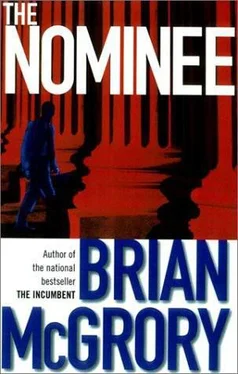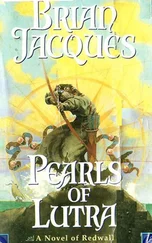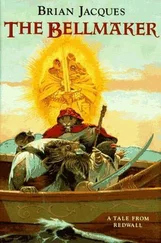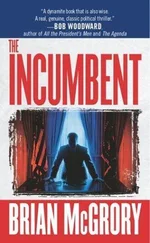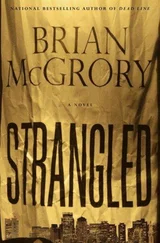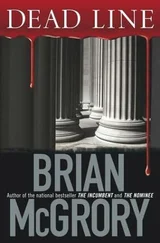He tried to smile to himself, but it came out as forced, short, stifled. He felt a pang in his stomach, then his chest. The memory again — the thundering shots, the spatter of crimson-colored blood, the screams, the inhuman look in the killer’s eyes. His father, dead on the ground.
Suddenly restless, Randolph took another gulp of beer and walked toward the windows that looked out over the vast, darkened space of the Boston Common below. It was a view he had analyzed a hundred times before, sometimes by the first light of an autumn morning with the trees drenched in oranges, yellows, and reds, sometimes on a late winter afternoon when the fading sun cast a purplish hue through the bare branches over the freshly fallen snow. Now he looked at it as if he was looking at his own mind: dark and blank and uneasy.
A knock sounded at his door. Before he could answer, a State Police trooper opened it a crack and said, “Gov, Robert Fitzgerald’s here.”
“Thanks, Quinn,” Randolph replied.
The door swung open and a tall, silver-haired man walked in, an interesting cross between patrician elegance and Irish ruddiness. He wore a navy blazer over a blue button-down shirt, casual slacks and a pair of ancient loafers. He had deep lines etched into his face, the lines of a man who has worked hard and played even harder.
“I feel like a rookie reporter,” Fitzgerald said. He flashed a smile — a curious one. The skin crinkled around his eyes. “The phone rings late on a Saturday night and I take off after the story like a bat out of hell. And here I am, Jimmy Olson on the scene.”
A pause, then Fitzgerald added with a warm, whimsical smile, “What the hell is going on?”
Randolph walked back across the room from the windows to the sitting area and beckoned Fitzgerald into a chair at the round antique coffee table. Only a single sidelamp with a hunter green shade lit the palatial office, giving the impression they were playing out an intimate scene on a large stage.
Randolph spoke as the two settled into facing chairs. “You’ve been a good friend to my family for a long, long time, Robert. You’re also the best, fairest, smartest newsman I’ve ever met, and because of that, I wanted you to know this first.”
Randolph paused, drawing a deep breath, letting the air slowly descend through his windpipe and into his lungs. Fitzgerald subconsciously fondled the pen in his chest pocket.
“I was invited down to the White House tonight by Clayton Hutchins. I met with him for about ten minutes. During that time, he offered me the nomination to be the attorney general of the United States.”
Another pause. Then, “I accepted on the spot.”
Fitzgerald’s eyes opened wide and his brows shot upward in surprise. He reflexively brought his left hand up to slowly rub the late-night whiskers on his cheek.
After an awkward, silent moment, he said, his tone flat, “Well, I guess all I can say is, congratulations, Lance. Congratulations.”
There was a pause, a sigh from the governor. He replied, “I was hoping for something more.”
A longer pause. A horn sounded on Beacon Street, a vagrant on the Common screamed that Ben and Jerry were out to destroy the world.
Fitzgerald stared at the burgundy rug, his eyes still wide open, nodding his head but not speaking. Finally, he said in a methodical voice, “You’ll make a great attorney general. You will. You were an outstanding prosecutor here in Boston. You’re a skilled politician. It’s in your blood and your genes. You’ll do great.”
When he finished, he stared up at Randolph, who sat looking sternly at him.
“That means a lot to me,” Randolph said, his voice like ice, void of any appreciation or even emotion. “Especially coming from you.”
Fitzgerald didn’t respond. Randolph continued, “The announcement will be made in the Rose Garden Monday afternoon. The president’s thinking in nominating me is not only a recognition of my political and prosecutorial abilities, but also to attempt to create a more bipartisan administration, and to prove to the public that he does not fear any further Democratic investigations.”
The two men locked stares again. Randolph drained his beer and said, “I’m authorized to give this to you now on a not-for-attribution basis, and would prefer you put in print that I was not available for comment. The sourcing should be an official familiar with the White House, which I guess I am now. Best that I know, theTimes and thePost won’t have this tomorrow. It’s yours alone.”
Randolph nodded at Fitzgerald, the nod being a punctuation point, a period, or in this case, an exclamation mark.
Fitzgerald said, with a resigned look on his face, “I appreciate that.” It was midnight, still time to make the final edition of the Sunday paper. He stood up, slowly, and walked from the governor’s office without another word, leaving young Lance Randolph alone in the dim light of the moment. His loafers clicked mournfully along the empty marble hallway and down the wide stairs until he finally reached the front door.
Sunday, April 22
WHY IS IT THAT A SEEMINGLY inconsequential bud on an otherwise barren elm can lighten the darkest mood, or that a simple tulip, having pierced the earth on its April ascent toward the heavens, can melt the wintriest exterior and touch the coldest soul?
I pose these questions not out of any specific interest in nature or psychology, but only because rays of sunshine were suddenly caressing my pale, dry cheeks like the golden fingers of some generous god, allowing my heart to grow light and my thoughts to grow expansive. From where I was standing, the first light of morning appeared above the downtown skyline and cast a warm glow across the stately willows, the freshly filled duck pond, and the vibrant meadows of the Public Garden, in what felt like the virgin moments of a reluctant spring. Two weeks earlier, sixteen inches of snow had fallen on our quaint hamlet of Boston. The storm was followed by days of windswept rain that turned the blackened, crusty ice into deep puddles of unforgiving slush. And finally, meteorological salvation. Ah, but my benevolent mood gets away from me.
“Give me that,” I said with mock seriousness, thrusting my hand into Baker’s sizable mouth to pull out a muddy, slobber-soaked tennis ball.
No sooner had I grabbed it with my now-disgusting fingers than the fickle hound lost any semblance of interest, having directed his entire being toward a trio of squirrels playing in a nearby grove of trees. He stood frozen on the path, his right front leg delicately in the pointing position, casting an occasional sidelong glance my way to make sure I didn’t do anything typically, foolishly human to disrupt his prey. Then he lunged toward them, sending the rodents scurrying in various directions for trees. He trotted in a wide circle, a victory lap of sorts, before walking back and taking the ball out of my hand with a half jump and a slight snort. Glad I could be of nominal use.
Rejuvenation. A renaissance, even. It was 6:30 in the morning as I peeled off my sweatshirt after a three-mile walk from the waterfront to the park and began skipping rope on an empty stretch of path. Baker roamed off in pursuit of more squirrels. My mind began wandering as well.
Things were good. Another hour of soothing sunshine and they might actually be excellent. I had moved from Washington to Boston, inarguably the greatest city in these United States. My heart was starting to feel whole again, or at least not shattered into a trillion fragments. Women seemed to find me interesting. I found myself fascinating. And I was on the verge of breaking one hell of a great story about our governor, the young Lance Randolph, lying about his prior record as a state prosecutor. Yes, good and getting better.
Читать дальше
